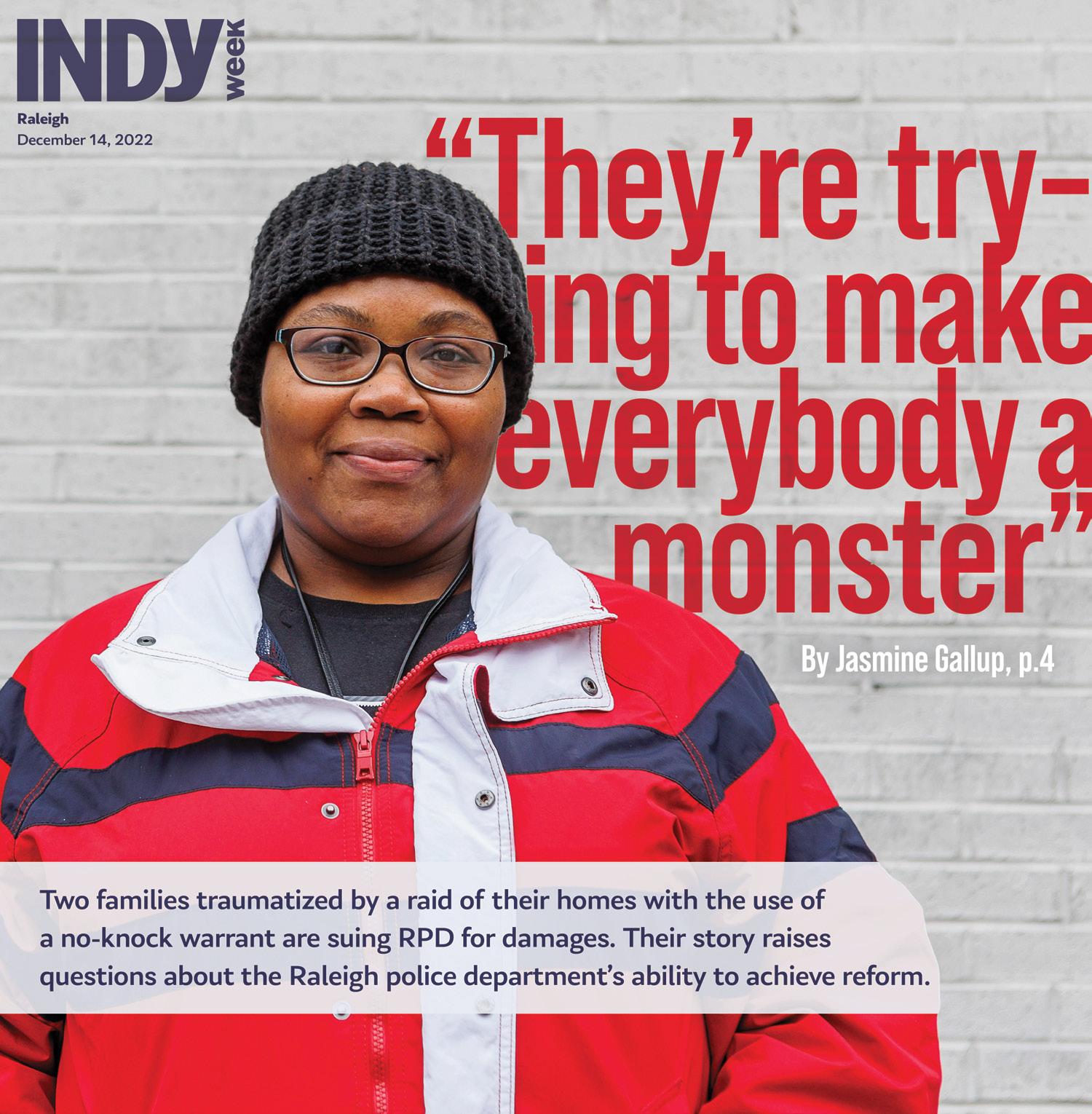
4 RPD raided two families' homes using a no-knock warrant, leaving them traumatized. The police department's actions since raise real questions about its capacity for reform.
BY JASMINE GALLUP
6 Part One: Project Censored's 10 most censored news stories show a pattern predominating all others this year. BY PAUL ROSENBERG
9 A Q&A with Amanda Martin, a First Amendment expert, on the latest case pitting religious freedom and free speech against anti-discrimination protections. BY CHAD KNUTH
10 On its second attempt, a Wake charter school is improbably allowed to open. BY GREG
 CHILDRESS
CHILDRESS
ARTS & CULTURE
12 The North Carolina Conference of the United Methodist Church issued an apology letter related to "action and ination" in its previous support of the contentious Pioneers Durham BY SARAH EDWARDS
13 The stylish, approachable Rocks+Acid, now open in Southern Village, is not your typical wine shop. BY SARAH EDWARDS
14 In Durham, barber Marcus Hall takes his shop to your doorstep.
BY CHASE PELLEGRINI DE PAUR
16 Talking with Chapel Hill native Eliza McLamb about farming, viral music fame, and returning to the Triangle for a hometown show. BY LENA GELLER

2 December 14, 2022 INDYweek.com
NEWS
Raleigh W Durham W Chapel Hill VOL. 39 NO. 50 Turnover
at Cat’s
Carrboro on Thursday, Dec. 15. (See calendar, page 17.) PHOTO COURTESY OF CAT'S CRADLE
E M A D E T H I S PUBLISHER John Hurld EDITORIAL Editor in Chief Jane Porter Managing Editor Geoff West Arts & Culture Editor Sarah Edwards Staff Writers Jasmine Gallup Thomasi McDonald Lena Geller Copy Editor Iza
Interns Chad
Nathan
Contributors Spencer
Shelbi Polk, Dan Ruccia, Rachel Simon, Byron Woods CREATIVE Creative Director Nicole Pajor Moore Graphic Designer Izzel Flores Staff Photographer Brett Villena ADVERTISING Publisher John Hurld Sales Digital Director & Classifieds Mathias Marchington CIRCULATION Berry Media Group MEMBERSHIP/ SUBSCRIPTIONS John Hurld INDY Week | indyweek.com
Box 1772 • Durham,
27702 Durham: 320
Street,
|
Raleigh:
EMAIL ADDRESSES first initial[no space]last name@indyweek.com
SALES
Contents © 2022 ZM INDY, LLC All rights reserved. Material may not be reproduced without permission. THE REGULARS 3 Backtalk 17 Culture Calendar
COVER Photo by Brett Villena / Design by Nicole Pajor Moore
CONTENTS
plays
Cradle,
W
Wojciechowska
Knuth, Lia Salvatierra
Hopkins
Griffith, Brian Howe, Kyesha Jennings, Jordan Lawrence, Glenn McDonald, Nick McGregor, Gabi Mendick,
P.O.
N.C.
East Chapel Hill
#200 Durham, N.C. 27701
919-286-1972
16 W Martin St, Raleigh, N.C. 27601
ADVERTISING
advertising@indyweek.com Raleigh 919-832-8774 Durham 919-286-1972 Classifieds 919-286-6642
B A C K T A L K
Last week for print, Thomasi McDonald wrote a tribute to beloved Durham legal mind, “barfather,” and man about town Marlon Williams after Williams died suddenly last month at one of his favorite local haunts, the Accordion Club on Geer Street. Readers had a lot of conflicting thoughts about the piece, but the love for Marlon is consistent. WANT
“Literally the worst article I’ve read in remembrance of someone,” wrote reader JOE SABO on Facebook. “I hope no one else’s life is remembered in this way this was written. Why the hell would you describe how they died and also include ‘they drank all day.’ I knew Marlon personally and this [is] the most fucking disgusting en memoriam I’ve ever read. Please redo this piece.”
And we received this email from reader BEN FLETCHER: “This article is disgusting and the Indy should be ashamed of itself.”
Other readers praised the story, or parts of it, and shared their own fond memories of Marlon.

“If in the end I get a little remembrance like this it will have all been worth it,” wrote Twitter commenter @JOSHABANKS. “Be a decent person, bring some joy into other people’s lives and do the shit you love. Rest In Power Marlon.”
“Like (I suspect) a lot of long-time Durhamites, I didn’t *really* know Marlon, but I definitely recognized him and we exchanged some passing pleasantries over the years,” wrote Twitter commenter @BULLCITY-
BRIAN. “Also, we were neighbors for a bit. Feels a lot less Durham knowing he’s gone. Anyway, this is a beautiful tribute …”
“R.i.p bro love you,” wrote NISHUN STONE
“RIP marlon! Those downtown bars won’t be the same without you popping in and out,” wrote TRAVIS T MURF.
“Marlon was one of my very favorite customers of my bartending days,” wrote GRACE LEMPP. “I was a young bartender new to Durham, entering the Main Street scene with no idea what I was getting into—and he became an immediate friend and one of my regulars. Marlon was kind, hilarious, loyal, thoughtful, and full of stories. He had a fantastic laugh …. Thankful for his presence in the world, which has me missing Durham a lot.”
“He was one of my favorite people,” wrote KHUWAILAH-COOKIE BEYAH. “I met him because he was a customer at the JJ and he became a dear friend. My heart is broken, but at least he passed with people who cared around him.”
“So sad to see that he passed away!” wrote Facebook commenter CAROL LINDSLEY “He was always so kind and helpful when I
started working as a paralegal in Durham in 2000. Rest in Peace sweet Marlon.”
“I’m so lucky to have watched our ‘stories’ with Marlon at the Blue Horn Lounge in Chapel Hill when I first moved here four years ago!” wrote Facebook commenter ALLIE PARKS “Marlon was a one hell of a kind and amazing man …”
“left out the pinhook, where he was also a longtime regular,” wrote Facebook commenter MELVIN PEÑA. “i used to see him there all the time going back to the days of the laser fish mural and the green wall. we’d talk about the vicissitudes of notre dame football and our experiences in south bend.”
“I remember the Sunday chats at the Joyce. Great person,” wrote commenter REGGIE ALLEN.
“Awesome guy. He’ll be missed,” wrote commenter LEWIS A. DANCY
McDonald’s remembrance of Marlon was shared widely on social media, with so many readers surprised and saddened to learn of his death but also taking the time to celebrate his life. Marlon will be missed, indeed. Rest in peace.
INDYweek.com December 14, 2022 3
TO SEE YOUR NAME IN BOLD? indyweek.com backtalk@indyweek.com @INDYWeekNC @indyweek
Forcible Entry
Two families traumatized by a raid of their homes with the use of a no-knock warrant are suing RPD for damages. Their story raises questions about the Raleigh Police Department’s capacity to reform.
BY JASMINE GALLUP jgallup@indyweek.com
I
t’s a familiar scenario: Police burst into a home with no warning. Someone draws a weapon. Shots are fired. Next thing you know, there’s a body on the ground.
Nationwide, the use of “no-knock” or “quick-knock” search warrants has proved problematic, with police officers subject to higher risks and innocent people often caught up in the crossfire. It’s no different in North Carolina where, two years ago, Raleigh police officers raided the wrong home, terrorizing the Black family who lived there.
The “no-knock” warrant officers executed in May 2020 didn’t have fatal consequences, but it easily could have. And despite the fact that there were no deaths, Yolanda Irving and her children are still traumatized.
The case itself is a tangle of mishaps and mistakes. First, the warrant was not for Irving’s home. Raleigh police officers intended to search a different house on the same street. On the warrant, the picture of the house is correct, but the address is wrong.
Second, in addition to illegally raiding Irving’s home, police also entered the home of Irving’s next-door neighbor Kenya Walton, for which they had no warrant at all. After following several teenagers into both homes, officers pointed assault rifles at the two families, put handcuffs on Walton’s 15-year-old son, Ziyel, and held every-
one under watch for more than an hour as their homes were ransacked.
Third, it was disgraced former Raleigh police officer Omar Abdullah who procured the warrant. Abdullah was fired last year after he worked with a corrupt informant to jail a dozen Black men on false drug charges. The warrant fabricates a drug buy in what seems to be yet another attempt by Abdullah to make a wrongful arrest.
Much of this is old news. Abdullah’s conspiracy and his subsequent firing, as well as the $2 million settlement the Raleigh Police Department (RPD) reached with the wrongfully incarcerated men, was widely reported. Fewer people know, however, that Irving and Walton are also bringing a lawsuit against RPD. And recently, new developments in the case have raised serious doubts about the RPD’s willingness to reform.
The raid
Two years ago, on a Thursday afternoon in the spring, Irving was getting ready to relax with some TV before dinner when her 14-year-old son Jalen ran upstairs, screaming about SWAT.
“We thought that he was joking. Me, my kids … we thought he was just playing,” she says. “First I [saw] him dive on his bed, with his arms like, ‘I’m not moving, I’m not
moving.’ And then going around the corner and seeing SWAT with guns pointing our way—” Irving pauses here, her voice trembling. When she says the word “guns,” it’s with a heavy sigh as she holds back tears.
“I was scared,” she says. “I thought my son was going to die …. The way he was running, he was running for his life. It’s like every step he made, they made. So it was like they could have just took the shot at any time.”
What Irving saw when she turned the corner were members of RPD’s Selective Enforcement Unit, the department’s equivalent of a SWAT team, carrying automatic weapons. They made Irving get on the floor, separated her from her daughter, and surrounded them.
They shouted at Jalen to get on the floor, a command impossible for him to obey since he is partially paralyzed. Eventually, they relented and let him remain on the bed, Irving says.
“I finally asked them, ‘What is this about?’” she says. “They said it was a search warrant, they’re looking for drugs or money. And I’m like, ‘What drugs? What money? I don’t know what you’re talking about.’”
The officers brought Irving and her children downstairs, where she saw her nextdoor neighbor’s son Ziyel in handcuffs. Officers held them there for about an hour and a half as they ransacked the house,
Irving says, turning over furniture and looking for contraband that wasn’t there. They searched her kitchen cabinets for heroin. At that point, Abdullah came in.
“I’m guessing that he finally looked at us and realized that he had made a bad mistake,” Irving says. “But nobody’s telling us anything. They’re not talking to us. I am actually trying to make conversation with the other police officers so my kids won’t be so scared, because I am petrified.”
Irving says the officers continued to search her house before eventually filtering out. Abdullah showed her the search warrant, which had the wrong address. Now, she’s angry. Officers are walking away without answering her questions.
“You could have shot my son, you could have shot my daughter,” Irving says. “Then you’re having us on the ground for an hour or two, not telling us anything, and then you’re going to just walk away from me? No. Somebody needs to tell us something.”
The fallout
Despite the raid, the Raleigh Police Department remained reluctant to answer Irving’s questions, she says. In February, Irving and Walton—with the help of Emancipate NC, a nonprofit fighting for criminal justice reform—filed a lawsuit seeking compensation for their “loss of liberty …
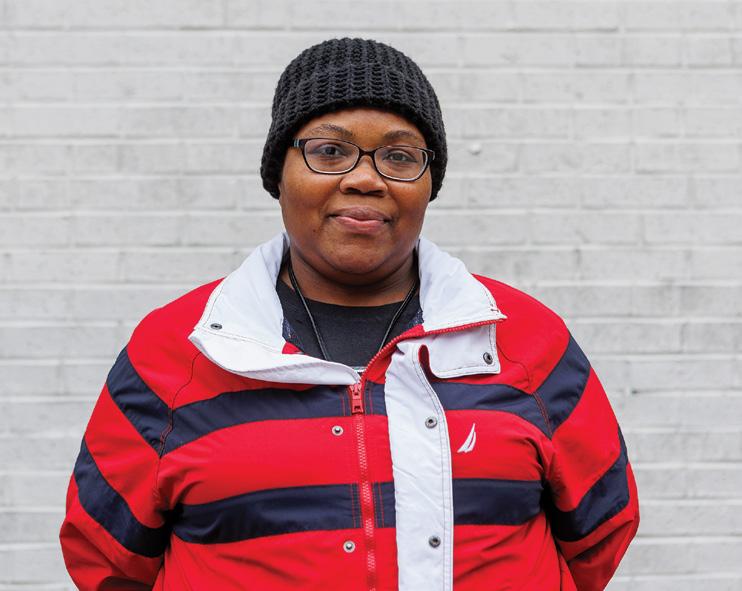
4 December 14, 2022 INDYweek.com N E W S
Raleigh
Kenya Walton, Raleigh resident whose home was wrongfully raided by an RPD SWAT Team in 2020. PHOTO BY BRETT VILLENA
physical pain and injuries, serious psychological and emotional damage, and loss of quality of life,” according to the complaint.
After the raid, Irving felt unsafe in her own home, she says. Her son Jalen’s grades dropped and he wouldn’t leave the house. She and her family were already distrustful of the police, but now they avoid them at all costs.
“Jalen doesn’t really go outside anymore. He doesn’t talk to a lot of people [any] more. He’s just really standoffish,” Irving says. “I was scared, so I broke my lease and just left, because I was afraid they [were] going to come back. I really was.”

Walton’s family felt the effects as well, she says. Her son Ziyel, who was handcuffed, is also afraid to leave the house. His fear of crowds is so bad that he was unable to attend school in person, she says. When he gets a haircut, Walton pays to clear out the barbershop for an hour.
“Ziyel has it worse than everybody,” Walton says. “His anxiety is really bad. He used to be outside playing with the kids. Every time we had a family outing, he used to participate. [Now] he can’t stand being in pictures.”
RPD’s use of no-knock warrants
In addition to seeking damages for Irving and Walton, the lawsuit includes Emancipate NC as an “organizational plaintiff.” The nonprofit joined in an effort to compel the RPD to stop its widespread practice of using no-knock and quick-knock warrants, says lawyer Elizabeth Simpson.
The lawsuit has raised questions about RPD’s policy on no-knock warrants. In the two years since the lawsuit was filed, the RPD has continued to serve warrants in a no-knock or quick-knock style, Emancipate NC argues. The nonprofit cites the raid of Amir Abboud’s home in April of 2021, which is captured on video.
The day the suit was filed, in February, police chief Estella Patterson told WRAL the RPD does not execute no-knock warrants, although she did not point to a specific policy.
At that time, the RPD’s policy on searches of residences (enacted January 11, 2021) did not include any language about no-knock or quick-knock warrants, merely stating that “a uniformed police officer shall be present if there is reason to believe that forcible entry may be required.”
In response to the INDY’s request for comment in late November, RPD spokesman Lt. Jason Borneo pointed to a revised version of the search policy, apparently adopted in May, three months after the
lawsuit was filed. Borneo declined to comment on the lawsuit, citing RPD’s policy of not commenting on pending litigation.
“The officer must give notice of the officer’s authority and purpose before entering,” the policy reads. “The Raleigh Police Department will not seek or serve ‘No-Knock’ search warrants.”
This revised policy was only made public, however, months after Patterson’s statement to WRAL. Earlier versions of the policy document (from late May and August) do not include any language about “no-knock” warrants.
Last month, Emancipate NC asked Chief Patterson to participate in a deposition to answer questions about the RPD’s policy. In response, the RPD legal team quickly moved for a protective order to prevent the
Simpson says. “The purpose of the ‘knock and announce’ requirement is to give people an actual opportunity to realize what is happening and to voluntarily permit entry. By entering one or two seconds after the knock, Raleigh police officers are still creating a very risky situation where residents are caught by surprise.”
That element of surprise “needlessly risks the lives of both police and civilians, who may react out of fear and stress, rather than rationality,” Simpson adds. “Police departments that operate under best practices prioritize the sanctity of human life over the small chance someone could destroy evidence during a brief pause to permit voluntary entry.”
Emancipate NC wants the RPD to implement reforms to its search policies like the ones put in place by the Charlotte-Mecklenburg Police Department and the Buncombe County Sheriff’s Department. Both agencies require officers to “ascertain that they are being denied entry before they forcibly enter a home, unless there are special extenuating circumstances, like risk to life,” Emancipate NC wrote in a news release.
Nobody wants to apologize
Before the lawsuit was filed, Irving had basically given up on justice being done, she says. Abdullah’s involvement, which brought many of his wrongful actions to public light, continues to shape the case. Irving and Walton each say the most frustrating thing for them is the RPD’s refusal to admit wrongdoing.
deposition. No decision has yet been made in favor of either party, but the move was one more step in an ongoing campaign of resistance from the RPD, which has tried to keep information about the raid (and its policies) under wraps.
Earlier this year, the RPD’s legal team successfully fought to prevent body camera footage of the raid from being publicly released. They also tried to get Emancipate NC removed from the case in November, a motion that was denied.
The dangers of quick-knock warrants
Regardless of RPD’s policy on no-knock warrants, further reforms around quickknock warrants are needed, says Simpson.
“While Raleigh police may have ended the official policy of using no-knock warrants, they continue to enter private homes way too quickly after they knock,”
Before the raid, Walton had some respect for law enforcement, she says. Now, not so much. During her deposition, Walton says she felt like the RPD was trying to make it seem like her family was at fault.
“It made me look at the police force and law enforcement completely different,” Walton says. “I’m going to be honest, I’m not even looking for money. If they would just give me a genuine apology, it would sit well with me. Instead, they’re trying to make everybody a monster.”
Irving also wants the RPD to demonstrate some remorse, she says, although she’s still seeking justice for her children.
“I still feel like the city of Raleigh and Abdullah owe us an apology, and nobody wants to apologize,” she says. “I want them to understand that things could have gone sideways real quick. Then what would have happened? Then you apologize, if one of my sons was killed or hurt? Then you [were] going to say, ‘Oh, I’m sorry’? No, you need to say that now.” W
INDYweek.com December 14, 2022 5
“If they would just give me a genuine apology, it would sit well with me. Instead, they’re trying to make everyone a monster.”
The Censorship Beat
Project Censored’s top 10 most censored news stories show just one pattern dominating all others this year.
BY PAUL ROSENBERG backtalk@indyweek.com
Since its founding in 1976, Project Censored has been focused on stories—like Watergate before the 1972 election—that aren’t censored in the authoritarian government sense but in a broader, expanded sense reflective of what a functioning democracy should be, censorship defined as “the suppression of information, whether purposeful or not, by any method—including bias, omission, underreporting, or self-censorship—that prevents the public from fully knowing what is happening in society.” It is, after all, the reason that journalism enjoys special protection in the First Amendment: without the free flow of vital information, government based on the consent of the governed is but an illusory dream.
Yet, from the very beginning, as A.J. Liebling put it, “freedom of the press is guaranteed only to those who own one.”
In their introduction to Project Censored’s annual State of the Free Press, which contains its top censored stories and much more, Project Censored’s Mickey Huff and Andy Lee Roth take this condition head-on, under the heading State of the Free Billionaire, in contrast to the volume’s title, State of the Free Press 2023. Following a swift recap of historic media criticism highlights—Upton Sinclair, the aforementioned Liebling, Ben Bagdikian, Edward Herman, and Noam Chomsky—they dryly observe, “History shows that consolidated media, controlled by a handful of elite owners, seldom serves the public interest,” and briefly survey the contemporary landscape before narrowing their gaze to the broadest of influencers:
Despite the promise of boundless access to information, Silicon Valley mirrors legacy media in its consolidated ownership and privileging of elite narratives. This new class of billionaire oligarchs owns or controls the most popular media platforms, including the companies often referred to as the FAANGs—Facebook (Meta), Apple, Amazon, Netflix, and Google (Alphabet).
Obviously, this was written before Elon Musk’s purchase of Twitter, but it’s an apt reminder that his wildly out-oftouch world view is not just an individual, personal aberration but also a symptom of wider systemic dysfunction. “In pursuit of their own interests and investments,
media tycoons past and present, again and again, appear to be conveniently oblivious to the main frame through which they filter news—that of class, including class structure and class interests,” Huff and Roth write. “Consequently, they often overlook (or ignore) conflicts of interest that implicate media owners, funders, investors, and advertisers, not to mention their business clients on Wall Street and in Big Pharma, Big Tech, and the military–industrial complex.”
This observation perfectly frames the majority of stories in Project Censored’s top 10 list, starting with the first two stories: massive subsidies of the fossil fuel industry and rampant wage theft—concentrated on the most vulnerable workers—that eclipse street crime in the magnitude of losses, but are rarely punished, even when offenders are caught dead to rights. It echoes clearly through the stories on Congress members’ investments in the fossil fuel industry, the role of corporate consolidation in driving up inflation in food prices, Bill Gates’s hidden influence on journalism, and major media outlets lobbying against regulation of surreptitious online advertising, and only at slight remove in two others having to do with dark money, and one about the suppression of Environmental Protection Agency reports on dangerous chemicals. Indeed, only one story out of 10 is somewhat removed from the sphere of corporate corruption concerns: the story of the CIA’s plans to kidnap or kill Julian Assange.
Every year, I note that there are multiple patterns to be found in the list of Project Censored’s stories, and that these different patterns have much to tell us about the forces shaping what remains hidden. That’s still true, with three environmental stories (two involving fossil fuels), three involving money in politics (two dark money stories), and two involving illicit surveillance. But the dominance of this one pattern truly is remarkable. It shows how profoundly the concentration of corporate wealth and power in the hands of so few distorts everything we see—or don’t—in the world around us every day.
Here then, is this year’s list of five of Project Censored’s top 10 censored stories (look for the rest in next week’s edition of the INDY or read the whole list online at indyweek.com).
Fossil Fuel Industry
Subsidized at Rate of $11 Million per Minute
Globally, the fossil fuel industry receives subsidies of $11 million per minute, primarily from lack of liability for the externalized health costs of deadly air pollution (42 percent), damages caused by extreme weather events (29 percent), and costs from traffic collisions and congestion (15 percent). And two-thirds of those subsidies come from just five countries—the United States, Russia, India, China, and Japan. These are key findings from a study of 191 nations published by the International Monetary Fund, or IMF, in September 2021 that were reported in The Guardian and Treehugger the next month but have been ignored in the corporate media.

No national government currently prices fossil fuels at what the IMF calls their “efficient price”—covering both their supply and environmental costs. “Instead, an estimated 99 percent of coal, 52 percent of road diesel, 47 percent of natural gas, and 18 percent of gasoline are priced at less than half their efficient price,” Project Censored noted.
“Efficient fuel pricing in 2025 would reduce global carbon dioxide emissions 36 percent below baseline levels, which is in line with keeping global warming to 1.5 degrees, while raising revenues worth 3.8 percent of global GDP and preventing 0.9 million local air pollution deaths,” the report stated. The G7 nations had previously agreed to scrap fossil fuel subsidies by 2025, but the IMF found that subsidies have increased in recent years, and will continue increasing.
“It’s critical that governments stop propping up an industry that is in decline,” Mike Coffin, a senior analyst at Carbon Tracker, told The Guardian. “The much-needed change
6 December 14, 2022 INDYweek.com N E W S
could start happening now, if not for the government’s entanglement with the fossil fuels industry in so many major economies,” added Maria Pastukhova of E3G, a climate change think tank.
“Eliminating fossil fuel subsidies could lead to higher energy prices and, ultimately, political protests and social unrest,” Project Censored noted. “But, as the Guardian and Treehugger each reported, the IMF recommended a ‘comprehensive strategy’ to protect consumers—especially lowin-come households—impacted by rising energy costs, and workers in displaced industries.”
No corporate news outlets had reported on the IMF as of May 2022, according to Project Censored, though a November 2021 opinion piece did focus on the issue of subsidies, which John Kerry, U.S. special envoy for climate change, called “a definition of insanity.” But that was framed as opinion and made no mention of the indirect subsidies, which represent 86 percent of the total. In contrast, “in January 2022, CNN published an article that all but defended fossil fuel subsidies,” Project Censored noted. “CNN’s coverage emphasized the potential for unrest caused by rollbacks of government subsidies, citing ‘protests that occasionally turned violent.’”
penalty money in addition to back wages—in just 14 percent of those cases,” they wrote. In addition, “the division often lets businesses avoid repaying their employees all the money they’re owed. In all, the agency has let more than 16,000 employers get away with not paying $20.3 million in back wages since 2005.”

We’re talking about some major companies. Halliburton, G4S Wackenhut, and Circle K Stores were among “the worst offenders,” they reported.
That report kicked off the center’s “Cheated at Work’’ series, which showed that “U.S. employers that illegally underpaid workers face few repercussions, even when they do so repeatedly. This widespread practice perpetuates income inequality, hitting lowest-paid workers hardest.”
“Wage theft includes a range of illegal practices, such as paying less than minimum wage, withholding tips, not paying overtime, or requiring workers to work through breaks or off the clock. It impacts service workers, low-income workers, immigrant and guest workers, and communities of color the most,” Project Censored explained.
Wage theft also includes worker misclassification as independent contractors—long the case with port truckers, and more recently gig workers. A 2014 study from the National Employment Law Center estimated that “California’s port trucking companies are liable to drivers for violations of wage and hour laws for $65 to $83 million each month, or $787 to $998 million each year.”
Lack of resources is largely to blame for the lax enforcement, Project Censored explained: “As of February 2021, the Wage and Hour Division employed only 787 investigators, a proportion of just one investigator per 182,000 workers covered by the Fair Labor Standards Act, Campbell and Yerardi noted. For comparison, in 1948 the division employed one investigator per 22,600 workers, or eight times the current proportion.”
EPA Withheld Reports on Dangerous Chemicals
In January 2019, the Environmental Protection Agency, or EPA, stopped releasing legally required disclosures about chemicals that present a “substantial risk of injury to health or the environment.” They had previously been posted in a searchable public database called ChemView.
In November 2021, as part of The Intercept’s “EPA Exposed” investigative series, Sharon Lerner reported that the EPA had received “at least 1,240 substantial risk reports since January 2019, but only one was publicly available.” The suppressed reports documented “the risk of chemicals’ serious harms, including eye corrosion, damage to the brain and nervous system, chronic toxicity to honeybees, and cancer in both people and animals,” Lerner wrote.
Wage Theft: U.S. Businesses
Suffer Few Consequences for Stealing Millions from Workers Every Year
In 2017, the FBI reported the cost of street crime at about $13.8 billion, the same year that the Economic Policy Institute released a study saying that just one form of wage theft—minimum wage violations—costs U.S. workers even more: an estimated $15 billion annually, impacting an estimated 17 percent of low-wage workers.
One reason it’s so rampant is that companies are seldom punished, as Alexia Fernández Campbell and Joe Yerardi reported for the Center for Public Integrity in May 2021, drawing on 15 years of data from the U.S. Department of Labor’s Wage and Hour Division. “The agency fined only about one in four repeat offenders during that period. And it ordered those companies to pay workers cash damages—
Lax enforcement is “especially problematic” in some 14 states that “lack the capacity to investigate wage theft claims or lack the ability to file lawsuits on behalf of victims,” according to a 2017 Economic Policy Institute report. In contrast, the center’s report “mentioned local successes in Chicago (2013), Philadelphia (2016), and Minneapolis (2019),” Project Censored noted, but “workers’ rights advocates continue to seek federal reforms.”
“Since May 2021, a handful of corporate news outlets, including CBS News, covered or republished the Center for Public Integrity’s report on wage theft,” Project Censored noted, but “corporate coverage tends to focus on specific instances involving individual employers,” while ignoring it “as a systemic social problem” as well as ignoring the “anemic federal enforcement.”
That could change if Congress were to pass the Wage Theft Prevention and Wage Recovery Act of 2022, which “would amend the Fair Labor Standards Act to protect workers from wage theft, according to Ariana Figueroa of the Virginia Mercury,” Project Censored noted, concluding with a quote from Minnesota congressperson Ilhan Omar: “It is clear more DOL [Department of Labor] funding and additional federal reforms are needed in our localities in order to protect our most vulnerable workers.”
“The reports include notifications about highly toxic polyfluoroalkyl substances, or PFAS, chemical compounds that are known as ‘forever chemicals’ because they build up in our bodies and never break down in the environment,” Project Censored noted. “The Environmental Working Group explains that ‘very small doses of PFAS have been linked to cancer, reproductive and immune system harm, and other diseases. For decades, chemical companies covered up evidence of PFAS’ health hazards.’” Their spread throughout the world’s oceans, along with microplastics, was Project Censored no. 5 story last year.
It wasn’t just the public that was kept in the dark, Lerner reported. “The substantial risk reports have not been uploaded to the databases used most often by risk assessors searching for information about chemicals, according [to] one of the EPA scientists …. They have been entered only into an internal database that is difficult to access and search. As a result, little—and perhaps none—of the information about these serious risks to health and the environment has been incorporated into the chemical assessments completed during this period.”
“Basically, they are just going into a black hole,” one whistleblower told Lerner. “We don’t look at them. We don’t evaluate them. And we don’t check to see if they change our understanding of the chemical.”

Apart from The Intercept, “only a handful of niche publications have reported on the matter,” Project Censored noted.
However, in January 2022 Public Employees for Environmental Responsibility (PEER) filed a lawsuit to compel the EPA to disclose the reports, following up on an earlier public records request which, the National Law Review reported, was “built upon information reported in a November 2021 article in The Intercept.” Just weeks later the EPA announced it would resume posting the reports in Chem-
INDYweek.com December 14, 2022 7
View, Project Censored noted. “Clearly, independent journalism contributed significantly to this outcome,” they said. “Had it not been for the work of investigative journalist Sharon Lerner at The Intercept, EPA whistleblowers would not have had a platform to share concerns that ultimately led the agency to resume these critical public disclosures.”
twenty-two Republican members of the Energy and Commerce Committee are invested in the fossil fuel industry. As Project Censored detailed in the no. 4 story on the Top 25 list two years ago, these individuals’ personal financial interests as investors often conflict with their obligation as elected legislators to serve the public interest.”

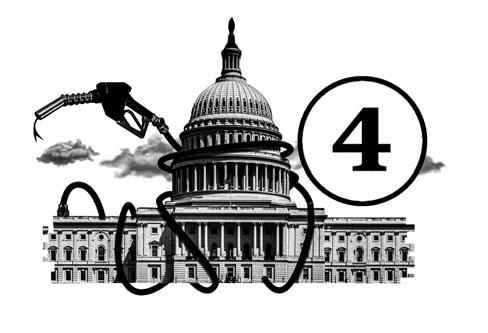
Oil and gas lobbying totaled $119.3 million according to OpenSecrets, while 2020 election spending topped $40 million for congressional candidates—$8.7 million to Democrats and $30.8 million to Republicans. This came as the International Energy Agency warned that no new fossil fuel developments can be approved for the world to have a 50/50 chance to reach net-zero emissions by 2050, Moore reported. And, yet, “production of oil and gas is projected to grow 50 percent by 2030 without congressional action,” Project Censored noted. “The fact that so many lawmakers have invested considerable sums in the fossil fuel industry makes it extremely unlikely that Congress will do much to rein in oil and gas production.”
As of May 21, 2022, Sludge’s reporting had gotten no corporate coverage, repeating the whiteout of a similar report in 2020. “Corporate news outlets have only reported on the fact that clean energy proposals are stalled in Congress, not the financial conflicts of interest that are the likely cause of this lack of progress,” Project Censored concluded.
2020, but also funded entities in 2020 that played a role in the insurrection to the sum of over $37 million,” Accountable.US reported.
While there has been coverage of dark money spending on Supreme Court nominations, Igor Derysh at Salon was alone in reporting the related involvement in January 6.
Just one group, JCN, spent $2.5 million “before Biden even named his nominee” Ketanji Brown Jackson, Derysh reported, “accusing Biden of caving in to leftists by promising a ‘Supreme Court nominee who will be a liberal activist.’” On the other hand, “JCN spent tens of millions helping to confirm Justices Neil Gorsuch and Brett Kavanaugh, according to OpenSecrets, and launched a $25 million effort to confirm Justice Amy Coney Barrett just weeks before the 2020 election,” he reported.
At Least 128 Members of Congress Invested in Fossil Fuel Industry
At least 100 U.S. representatives and 28 U.S. senators have financial interests in the fossil fuel industry—a major impediment to reaching climate change goals that’s gone virtually unmentioned by the corporate media, despite detailed reporting in a series of Sludge articles written by David Moore in November and December of 2021.
Moore found that 74 Republicans, 59 Democrats, and one Independent have fossil fuel industry investments, with Republicans outnumbering Democrats in both chambers. The top 10 House investors are all Republicans. But it’s quite different in the Senate, where two of the top three investors are Democrats, and Democrats’ total investments, $8,604,000, are more than double the Senate Republicans’ total of $3,994,126. Topping the list is Joe Manchin (D-WV), with up to $5.5 million of fossil fuel industry assets, while John Hickenlooper (D-CO) is third, with up to $1 million. (Most reporting is in ranges.) Many top investors are Texas Republicans, including Rep. Van Taylor, with up to $12.4 million worth of investments.
“Most significantly, many hold key seats on influential energy-related committees,” Project Censored noted. Senators include Manchin, chair of the Energy and Natural Resources Committee; Tina Smith (D-MN), chair of the Agriculture Subcommittee on Rural Development and Energy; and Tom Carper (D-DE), chair of the Committee on the Environment and Public Works. “Manchin cut the Clean Electricity Performance Program, a system that would phase out coal, from President Biden’s climate bill,” the project added.
In the House, Project Censored explained, “nine of the
Dark Money Interference in U.S. Politics Undermines
Democracy
The same group of conservative dark money organizations that opposed President Joe Biden’s Supreme Court nomination—Judicial Crisis Network (JCN), the 85 Fund, and their affiliated groups—also funded entities that played a role in the January 6 insurrection, according to a report by the watchdog group Accountable.US. They’re closely linked to Leonard Leo, co-chair of the Federalist Society, with money coming from Donors Trust (a dark-money group backed by the Koch network) and the Bradley Foundation.
“These dark money groups not only funded Leo’s network of organizations to the sum of over $52 million in
But more disturbingly, “Donors Trust has funneled more than $28 million to groups that pushed election lies or in some way funded the rally ahead of the Capitol riot,” while “members of the Federalist Society played key roles in Donald Trump’s attempts to overturn the election,” including attorney John Eastman, architect of Trump’s plan to get Vice President Mike Pence to overturn the election; Senators Josh Hawley (R-MO) and Ted Cruz (R-TX), who led the objections to the certification of Trump’s loss after the riot; and Texas attorney general Ken Paxton, who filed a lawsuit to throw out election results in key states, effectively overturning Biden’s victory. In addition, 13 of the 17 other Republican attorneys general who joined Paxton’s suit were also Federalist Society members.
“It should worry us all that the groups leading the fight against Biden’s historic nomination of Judge Jackson to the Supreme Court are tied to the Jan. 6 insurrection and efforts to undermine confidence in the 2020 election,” Kyle Herrig, president of Accountable.US, told Salon
“The influence of dark money—political spending by organizations that are not required to disclose their donors— presents a major challenge to the swift functioning of the judicial nomination and confirmation process, and the US government as a whole,” Project Censored noted. “Dark money deeply influences political decisions in favor of select individuals’ or groups’ agendas rather than in support of the public’s best interests.”
Right-wing dark money’s role in fighting Judge Jackson’s nomination and confirmation process was highlighted by Business Insider in February 2022, along with op-eds in both the Wall Street Journal and the Washington Post, which covered the discussion of dark money during Judge Jackson’s confirmation hearings, and a March 2022 Mother Jones report. “However,” Project Censored noted, “none of the articles featured in the corporate press covered dark money supporting Trump’s Big Lie, the impact such funding had on promoting and reinforcing anti-democratic ideology, or the ramifications of how such dark money spending erodes public trust in government and the election process.” W
©Random Lengths News, a division of Beacon Light Press, 2022.
Paul Rosenberg is a Los Angeles, California–based writer, senior editor for Random Lengths News, and a columnist for Salon and Al Jazeera English.
8 December 14, 2022 INDYweek.com
Speak or Stay Silent
A Q&A with First Amendment expert Amanda Martin on the newest lawsuit pitting religious freedom against anti-discrimination protections.
 BY CHAD KNUTH backtalk@indyweek.com
BY CHAD KNUTH backtalk@indyweek.com
The U.S. Supreme Court heard arguments last week in a case weighing a web designer’s bid to avoid working for same-sex couples planning their weddings, claiming the government cannot make her create messages that go against her religious beliefs in violation of her First Amendment rights.
Web designer Lorie Smith of Colorado, a conservative evangelical Christian who opposes same-sex marriage, is seeking an exemption from a state law that outlaws discrimination on the basis of sexual orientation in public accommodations. Smith sued the state in 2016, arguing that she has a free speech right under the Constitution’s First Amendment to reject requests by same-sex couples because it conflicts with her own views.
Back in 2018, the Supreme Court ruled 7-2 in favor of a Colorado baker who refused to bake a cake to celebrate the marriage of a same-sex couple, again because of a religious objection.
Smith’s case made headlines earlier this month, while just last week Congress passed a bill to codify same-sex and interracial marriages nationwide. The case, 303 Creative LLC v. Elenis, has garnered national attention and prompted concerns that the ruling could either force proprietors to work in violation of their beliefs or give the green light for businesses to discriminate willingly.
We spoke with Amanda Martin, a supervising attorney at Duke Law’s First Amendment Clinic and a free speech expert, about the case.
INDY Week: Was this First Amendment issue not resolved in 2018 with the case of Masterpiece Cakeshop v. Colorado Civil Rights Commission? How does this case differ?
Martin: When Masterpiece Cakeshop was in the news that certainly was the way it was being described and discussed, that this is the case that’s going to answer that question. That case did not answer that question
because of what I would call a nuance in the law, and that is that the Supreme Court made its ruling on almost a procedural basis on a matter of how the case had been handled by the Colorado Civil Rights Commission. The Supreme Court found that the commission had evidenced some hostility toward the baker’s interests, and rights, and beliefs, and so in that case the court sent the case back down … saying essentially that the process was flawed, and needs a do-over …. The court did not decide the ultimate issue of how to reconcile those issues, and that’s why we’re dealing with it yet again.
Why do you think people are so interested in this question?
I think people are interested for two or three reasons. First, yes, I do believe that the decision that comes down this time will address and at least partially answer the question. Another reason is the 6-3 majority conservative make-up of the court. Including of course some references in the Dobbs and Obergefell decisions. […] They are all interrelated because if there is no right of gay marriage, then arguably it calls into question the rights of anyone wanting a wedding website, which is the issue at play in 303 Creative
What does this case mean for Colorado’s antidiscrimination laws?
In 303 Creative, it began as a case on two grounds: First Amendment rights and religious freedom. The Supreme Court only heard the First Amendment aspects of the case. I don’t know exactly what this is going to mean, but I think there is some importance to bear that in mind. Lorie Smith’s argument is that application of the Colorado
Civil Rights Law, if it required her to provide services to gay couples wanting a wedding site, it would amount to compelled speech. Her argument was that forcing her to create these websites would be tantamount to forcing her into an endorsement of gay marriage, and the language that her lawyer used throughout the argument was that “she believes that that is a false marriage.” And so the question the court is first going to have to ask is whether this is compelled speech.
What can we determine so far as to the potential outcome of this case and what it could mean for free speech?
The Colorado law prohibits what it describes as discrimination. It also prohibits publishing statements with intent to discriminate. What is important to understand here is that there are no websites. Smith has not begun this business and subsequently been prosecuted for violating the law. She filed a prospective action saying I want the court to determine that this law is unconstitutional, at least as it would apply to me.
And so one of the things that seems to have frustrated some of the justices is that all of the conversation in the oral argument was hypothetical. This is a case with zero evidence. She is having to argue that this hypothetical, theoretical, not-yet-in-existence website would have conveyed a message with which she disagreed. That is difficult, yet I certainly think there is a strong likelihood she will prevail in this lawsuit given the current makeup of the court and given the oral argument.
Now what that will mean exactly is difficult to answer, because it will turn in very large part to how the court decides to resolve it. W
INDYweek.com December 14, 2022 9 N E W S Durham
Amanda Martin, attorney and lecturer. PHOTO COURTESY OF DUKE LAW FIRST AMENDMENT CLINIC
Second Time Lucky
On its second attempt at opening, a proposed Wake charter school gets an “improbable” green light.
BY GREG CHILDRESS backtalk@indyweek.com
The leaders of Heritage Collegiate Leadership Academy (HCLA) of Wake County sailed through a second-round interview last week to win improbable, but unanimous, support from the Charter School Advisory Board to open a K–8 school in northeastern Wake County. Why improbable?
In 2020, the charter board roundly rejected the school’s application, citing concerns about projected enrollment numbers and budget projections.
And several years earlier, Kashi Bazemore, the chairperson of the school’s board of directors and its likely principal, had been on the losing end of a contentious and messy State Board of Education–sanctioned takeover of a charter school. Bazemore founded and led that school, which operated under the same name—Heritage— in Bertie County.
The state board was prepared to revoke that school’s charter because of late financial audits and academic performance issues. But the revocation process was cut short when the Heritage board of directors agreed to allow charter operator Don McQueen to take over the foundering Bertie County school.
The takeover proved fatal for the school, which McQueen renamed Three Rivers Academy. The state board ordered it closed in January after NC Department of Public Instruction (NCDPI) investigators found numerous academic, fiscal, and governance shortcomings.
With that history, few people would have bet on a second act for Bazemore, who
felt angry and bitter after losing the Bertie County school to McQueen.
“I did say some ugly things,” Bazemore acknowledged in an interview with Policy Watch. “I did curse some people out. I did not hold my tongue.”
Bazemore described winning the charter board’s approval this week as a “miracle.”
“I prayed that all of the adults in the room would just focus on the children we are trying to serve as we sought their [charter board members’] approval,” Bazemore said. “What I saw was just that; my prayers were answered.”
Last Monday, a very different Bazemore appeared before the charter board. Rather than the angry and combative school leader that its members had seen before, she was poised and prepared, impressing charter board members with plans to open a school for children she contends are not being served well by the Wake County Public School System.
Supplemental data provided by the Heritage planning teams show many of the elementary and middle schools in northeast Wake County have received state performance letter grades of D or F.

Charter board chairwoman Cheryl Turner noted Bazemore’s personal and professional transformation.
“What we’re seeing now is just very different from what we’ve seen in the past, very positive in terms of the possibility of this being successful,” Turner said.
With a bit of irony, Turner noted that Bazemore will likely have a large pool of students to fill her school in the wake of the
state board’s decision to close McQueen’s Torchlight Academy in Raleigh last June. An exhaustive NCDPI investigation uncovered serious fiscal and governance issues, similar to those found at Three Rivers.
Torchlight’s closure left the families of hundreds of children from Wake and surrounding counties scrambling to find new schools. Many parents swore by the culturally enriched programs Torchlight provided its mostly Black and Latinx students.
“There were 600 kids at Torchlight who now have no place to go, so they really have, inherently, a population of people who are going to be interested because they’ve been in charters and theirs went away,” Turner said. “I honestly don’t think recruitment is going to be an issue if they locate in the northeast [of Wake County],” Turner said.
Bazemore said former Torchlight parents have begun to express interest in Heritage.
“We want them to know that we will be an option for them,” Bazemore said.
Like Torchlight Academy, Heritage will openly celebrate the culture and history of Black and Latinx students.
“People fail to realize how important that is to parents,” she said. “Black and Hispanic parents don’t want the general, neutral education where their children are being asked to not let their culture and heritage come through. We want children to be able
to be who they are in an environment that allows them and encourages them and has high expectations for them.”
Bazemore won an endorsement from former Office of Charter Schools director Dave Machado, whose leadership she often criticized.
“I’ve seen a different board, I’ve seen a different leader,” Machado said. “We need to take into consideration mistakes in the past, but I don’t think they ought to be penalized when there’s a path to run a better school this time.”
Machado stepped down in July to become the North Carolina state director for Charter Schools USA, a for-profit charter school management company based in Fort Lauderdale, Florida. He is an NC House appointee to the charter board.
Explaining her new outlook, Bazemore said time healed many of the wounds she suffered during the contentious loss of the Bertie County school in 2018.
“After being removed in time from the situation, I was able to see that there were so many things we were proud of, but there were some things we could have done better, that I could have done better as the executive director of the school,” Bazemore said. “Some of the complaints of noncompliance were accurate, and I had to step back and look at that and own that to get
10 December 14, 2022 INDYweek.com N E W S Wake County
PHOTO BY CDC VIA UNSPLASH
to a place where we can move forward.”
Bazemore believes her acknowledgment of those shortcomings helped win over the charter board.
The charter board will recommend that the State Board of Education allow Heritage to proceed with plans to open a new school in 2024. The state board ultimately decides which schools move forward but often follows the advisory board’s recommendations.

Plans call for Heritage to open with 440 students in grades K–6, then enroll 600 K–8 students by 2028. Several vacant buildings in northeast Wake County are being considered for the new school, Bazemore said.
Charter board members questioned Bazemore about the HCLA budget, which calls for paying teachers $40,000 a year. That amount, they said, won’t be competitive in Wake County.
Bazemore responded that Heritage will rely on a combination of new teachers and those willing to come out of retirement who want to supplement their income.
The state board has been reviewing charter applications, particularly those that hire for-profit management organizations, with more scrutiny in the wake of the Torchlight and Three Rivers debacles under McQueen’s leadership.
Unbeknownst to Torchlight’s board of directors, McQueen’s charter management firm, Torchlight Academy Schools LLC, reaped huge profits. McQueen and his wife, Cynthia McQueen, also drew hefty salaries and shared the wealth with a sonin-law and daughter who both worked for the school.
Meanwhile, the Three Rivers board of directors was a governing body in name only. McQueen controlled every aspect of the school.
Wake County Public Schools leaders cited Bazemore’s troubles in Bertie County in a letter to NCDPI and the Office of Charter Schools opposing the new school.
“There is nothing in the application that gives us confidence the problems that occurred at that school wouldn’t be repeated in a new Wake County charter school,” Wake County Board of Education chair Linda Mahaffey and Superintendent Catty Moore said in the letter.


Bazemore, however, is confident that the state board will view HCLA favorably if the focus remains on what’s best for children.
“If they [state board members] do that, then I’m sure we will be able to move forward,” she said. W
This story was originally published online at NC Policy Watch.



Wka e up withus
INDYweek.com December 14, 2022 11
Local news, events and more— in your inbox every weekday morning Sign up: INDY DAILY SIGN UP FOR THE
Point of Contention
The North Carolina Conference of the United Methodist Church has apologized for “action and inaction” related to Pioneers Durham.
BY SARAH EDWARDS sedwards@indyweek.com
In Texas this week, more than 400 churches voted to sever ties with the United Methodist Church (UMC) over disagreements with how the denomination, which is currently navigating a looming split, handles LGBTQ+ issues. Those congregations are expected to join the conservative faction of the church—the Global Methodist Church—when the UMC meets in 2024 and votes on a proposal to split the denomination over the disagreement.
In North Carolina last week, a different kind of action took place: the North Carolina Conference of the United Methodist Church (NCCUMC) issued a formal letter of apology to neighbors of Pioneers Durham. “When it comes to the Geer Street Community and Pioneers Church, we as the NC Conference of the UMC and the Office of New Faith Communities were too slow to recognize the need to make a change,” the two-page letter, issued on December 6, reads. “We are sorry we were slow to entirely comprehend the unique nature, values, and makeup of this neighborhood. We are sorry that we were not initially attentive to the harm that might be done when a new congregation was started, which was not fully affirming of the LGBTQIA+ community and inclusive of marriage equality, in a neighborhood which is known to be safe and affirming for LGBTQIA+ community members.”
INDY Week reached out to Pioneers Durham owners Sherei Lopez Jackson and Daniel Jackson via their Pioneers emails and did not receive a response by the time of publication, but in The News & Observer’s Thursday report, Sherei Lopez Jackson told the newspaper that the UMC would continue to be their “neighbors and siblings in Christ.”
Back in November 2021, Pioneers
Durham generated controversy within days of its opening announcement. Part of the controversy was its very specific packaging as a two-for-one church and business with a heavy emphasis on entrepreneurship, and part of it was an off-kilter relationship with its surrounding Old North Durham neighborhood and Durham at large and its religious marketing toward affluent young professionals. Parts of the controversy were as simple as its name.
“Choosing the name ‘Pioneers’ is just absolutely wild to me,” says Brandon Bayne, an associate professor of religious studies at UNC-Chapel Hill who is currently writing a book on “pioneer statutes and how they served to justify dispossession.”
And then, of course, much of the pushback has regarded Pioneers’ stance on gay marriage: that, as Pastor Sherei Lopez Jackson wrote on Instagram last year, “Christian marriage is a sacred covenant between one man and one woman and [I] believe that sexual intimacy has the potential to be at its healthiest in that context.”
Within months of the church opening its doors, the controversy evolved into a series of regular protests outside of Pioneers; in response, the NCCUMC made the church halt services and enter into mediation with other local UMC pastors. In June, Pioneers split from UMC entirely and joined the more conservative Wesleyan Church, which has a clearer anti-LGBTQ+ stance. But as the INDY reported in a follow-up story on the church, also in June, it was evident that community wounds still ran deep, as local religious leaders called on the NCCUMC—which invested in and helped start the church—for institutional ownership of the situation.
The letter is a response to those calls.
“The action of United Methodist churches engaging their communities is a common practice and core value of the denomination,” Mike Frese, district superintendent of the Corridor District of the NCCUMC, wrote to the INDY in an email. “This can be in the form of community meetings or personal communication. In this case, since the conversation was happening in a more public forum, an open letter seemed to be the most appropriate format.”
In a phone call, Bayne said that public apologies from a denomination to a community, as seen in the letter, are “pretty uncommon” in his experience, but he echoed Frese’s sentiments about accountability as a core value of the denomination.
“Christian communities have this sort of language built into their liturgy,” he said. “Methodists do as well. In their liturgy, they have a place for confession and a place for absolution. This pairing of needing to be truthful about the past before you ask others with whom you have a disagreement to move forward toward something like reconciliation is really crucial.”
A year after it announced its opening, Pioneers—which has hummed along, despite seeing very low foot traffic in the space— has continued to be a regular site of protest in Durham; last week a bike with a sign reading “This shop is a church that does not welcome everyone equally” was locked to the bike stand in front of the church.

But nothing happens in a vacuum. Events at the church have played out against a backdrop of national tensions. Pioneers’ contentious relationship with other UMC churches in Durham occurred as the UMC
at large was splintering. Pushback to the business arm of Pioneers mounted alongside concerns about gentrification in a city pushing marginalized residents out. The UMC’s deliberations around LGBTQ+ inclusion have taken place as the evangelical church has had to face—or not—its ties to the far right. And NCCUMC’s apology comes as hostility against the LGBTQ+ community across the nation has grown more and more dangerous, particularly in North Carolina, as we have seen this week.
On Thursday, Congress passed a landmark bill protecting same-sex marriage.
Joanne Andrews—who has lived with her partner in the neighborhood since the late nineties and has participated in the protests of Pioneers—felt reassured by the efforts of the letter, writing in an email: “I feel that their apology is sincere and heartfelt. Their entire organization is fracturing over this very issue and they gave our concerns full attention. Elizabeth Street UMC has been an affirming and inclusive church in our neighborhood for decades and it’s good to see the rest of their organization catching up.”
“Our goal remains for them to leave our neighborhood unless they state publicly that their position has changed,” Andrews continued, in reference to the church. “Pioneers has never once acknowledged our community’s concerns.”
On Instagram, a day after the UMC sent the letter to the Geer Street neighborhood, the church marked its time in the space, writing, “We are about to celebrate 1 year and reflecting on so much goodness .” W
12 December 14, 2022 INDYweek.com
E TC.
The Pioneers Durham storefront. PHOTO BY NICOLE PAJOR MOORE
ROCKS+ACID
712 Market Street, Chapel Hill | rocksandacidwineshop.com
Beyond the Village Vine
Luminary sommelier Paula de Pano’s new shop, Rocks+Acid, prioritizes adventurous palates and a new kind of wine culture.
BY SARAH EDWARDS sedwards@indyweek.com
On a crisp early December morning at 712 Market Street, about 200 wine glasses rest atop a long table running down the middle of the room. The dishwasher isn’t working yet, the windows looking out toward Southern Village are covered in heavy paper, and, a few days out from the shop opening, owner Paula de Pano is awaiting the delivery of several chairs.
But the glasses won’t sit empty for long and De Pano, the former beverage director at the Fearrington House and one of the South’s most prestigious sommeliers, has spent years preparing for her dream of opening a wine shop. It’s a dream organized by an unpretentious, ethical, and taste-driven approach to wine—and it has the potential to turn North Carolina wine culture on its head.
Paula De Pano is ready for it.
Rocks+Acid—the shop’s name, spelled out in neon letters above the cash register is a gesture at the shop’s focus on terroir and acid-focused wines—opened for business on December 7, with De Pano and Laura Francis, who also worked at the Fearrington, behind the bar. There’s ample room for drinking and mingling at Rocks+Acid, including at the communal table with seating for 16, and a selection of artisan cheeses for snack pairings; De Pano also has a long list of classes for wine nerds and beginners alike, with guest sommeliers and topics like “champagne and French Fries.”
Two such wine nerds are Sandy Stover and her husband, Keith, who met De Pano
eight years ago through her work at the Fearrington where they regularly came to taste the wines.
They’ve since become friends, and Stover speaks enthusiastically about the shop’s accessibility and range.
“Paula and Laura—well, they’re special, they’re just so approachable,” Stover says. “And when you look in that store—first of all, it looks so cool. And then you’ll see the two of them and they’re smiling. Obviously, you’re gonna walk in and be like, yeah, these are not some stuffy people back there smoking a pipe with the lights at a really low level.”
Imagine the usual dank, dark wine shop removed from the urgencies of a given era, and you’ll imagine the opposite of Rocks+Acid, which bills itself as “pro-women, immigrant, POC, and LGBTQ+” and which will donate 10 percent of proceeds the first Wednesday of every month to the nonprofit Inclusive Therapists, a national BIPOC therapy fund.
De Pano—who grew up in Manila in the Philippines and moved to the United States in 2008—knows what it’s like to make her way up in the industry: although wine is largely marketed toward women, the upper echelons of the wine world are still a boys’ club. To wit, De Pano is committed to championing wine by women and minorities, and most of the labels are the fruit of that commitment.
“When I got to New York, it was a sommelier team of seven and I was the only female,” says De Pano, who spent two

years as a senior sommelier at New York City’s intensive Eleven Madison Park. “And not only that, I’m coming from North Carolina and I’m an immigrant.”
Rocks+Acid sits between Weaver Street Market and Al’s Burger Shop and has a spacious, slightly industrial feel (the building used to house a dry cleaner).; in the spring, a large accordion door will be installed, opening the shop to the outdoors. Walking around, I realize how claustrophobic it can often feel to choose a wine from the cramped, fusty shelves of other shops. Here, no shelves bisect the room; instead, floor-to-ceiling shelves line its perimeter, showcasing around 1,400 backlit bottles of wine (eventually, the shop will carry closer to 2,000). Between the tall shelves and the neon sign, the vibe of the room falls somewhere between a hip music venue and a library.
De Pano’s encyclopedic-seeming inventory knowledge matches that library feel. Ask her about a bottle at random and she’ll eagerly tell the story behind its label illustration, the soil in which its grapes were grown, and what kind of cheese you could try it with. It’s a true sommelier’s shop: De Pano prides herself on far-flung relationships with producers located all over the globe whose wine she’s fallen in love with and whose trust she’s earned, and whose labels reflect small, family, or coopera-
tive-driven businesses with ethical practices she feels she can put her weight behind.
“We really want people to be adventurous and open to different flavor profiles and hopefully get out of their comfort zones,” she says, guiding me through the shop’s orange wine section. Picking up a bottle, she holds it up to the light; at the bottom, you can see a bit of sediment swirling. “I know people may not be used to unfiltered, lower SO 2 wine,” she says. “But these are really, really fun wines to have. It might be for people who are really into Kombucha if you like that flavor profile. A lot of people think of natural wines as mousy, or dirty smelling. But these are guys that really make a point to do it correctly.”
Most bottles are between $25 and $35—not casual purchases, certainly—but at Rocks+Acid, the act of choosing them comes as an adventure, and with an assurance of responsibility.
“To be able to source these wines takes a lot of work,” De Pano says. “And I always tell people, ‘Yeah, you see the final product, but do you understand how it was made? The labor?’ That’s another thing, too, that I’m very focused on. These are not just family-owned; these are people who treat their workers correctly and they’re environmentally conscious about sustainability efforts.” W
INDYweek.com December 14, 2022 13
Paula de Pano’s new Southern Village wine shop, Rocks+Acid.
F O O D & D R I N K
PHOTO BY BRETT VILLENA
BY KULSOOM RIZAVI, THE 9TH STREET JOURNAL
Clips on Wheels
Durham barber Marcus Hall can bring his shop to your doorstop.
BY CHASE PELLEGRINI DE PAUR arts@indyweek.com
To Marcus Hall, the time a client spends in his barber chair is sacred. A haircut is a ritual, a relationship between barber and client. The client must trust the barber. And the barber must transform the client into the best version of himself.
But Hall, 34, is different from other barbers. His shop is a 30-foot-long RV that makes house calls. You may have seen it around Durham—red, white, and blue (like a barber pole) with his shop’s name on the back: “NEED MOBILE BARBER? KLIPPAS MOBILE GROOMING.”
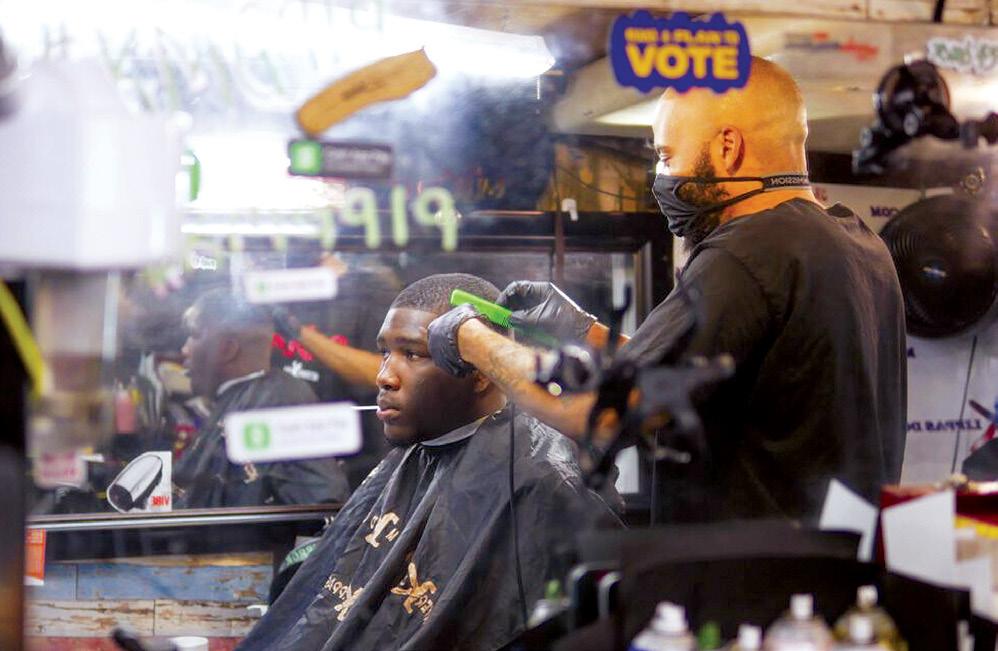
Hall himself keeps his head closely clipped, with more hair on his chin than his scalp. Born and raised in Durham, he talks lovingly about his city and his job. “You can give back anywhere,” said the 2006 Hillside High School graduate. “But giving back at home is always better.”
The RV has the feel of a regular shop, just in tighter quarters. A small TV is often playing TNT dramas, the dia-
logue lost under the buzzing of Klippas’s clippers. A shelf of hair sprays faces a shelf of books, where the thrillers of Eric Jerome Dickey sandwich Dante Lee’s Black Business Secrets. The couch cushions and wallpaper are red, white, and blue, in keeping with the barber pole theme.
The shop is so stuffed with equipment and books that it’s hard to tell where the professional life of Klippas the Barber ends and the personal life of Hall begins.
Hall decided to go mobile because he thinks customers appreciate the convenience and personal service in the RV.
“You get the barbershop to yourself,” he said as he clipped a client’s hair on a recent afternoon.
For clients like Zacc Lofton, the personal service and friendly conversation in the RV is a welcome change from the rest of his busy life. Lofton, who works remotely for an insurance company, has been seeing Hall for about three years.
“I’m more so on the quiet side, but Marcus somehow
gets me to talk,” Lofton said. “He finds some way to ask me about how my day’s going.”
Even in an RV, the barber chair is a special place for Hall’s clients, a place where they feel comfortable sharing details about their lives. With customers ranging from college football coaches to three-year-olds, Hall never knows where the conversation will go.
“All types of stories come through the barbershop,” he said, likening it to therapy. The time in his chair may be the only time his clients have to slow down and let themselves be cared for or share details about relationships or work. Sometimes they just fall asleep.
That personal relationship is so essential that Hall usually asks his next appointment to wait outside the RV if they arrive early. Customers are required to make deposits when they book appointments. This guarantees a one-onone slot with Hall.
A walk-in, hoping to get a haircut, was directed to grab a card. “Go to my website and make a deposit,” Hall told him. “I promise I’m here for whatever time you put.” That commitment comes with another price if you’re late, as a reel on Hall’s Instagram page details: “IF YOU ARE NOT IN THIS CHAIR AT YOUR TIME SLOT, YOU WILL BE CHARGED $10 GRACE/LATE FEE.”
Hall will bring the shop to you—your home or your business. But you can often find it parked on NC 55, just down the hill from NC Central University.
He likes the RV much better than his old way of doing house calls, setting up his equipment in a customer’s bathroom. He just couldn’t replicate that special barbershop experience with the right chair, the right lighting, or the right vibe.
14 December 14, 2022 INDYweek.com
Marcus Hall likes the RV much better than his old way of doing house calls, setting up his equipment in a customer’s bathroom.
TC.
PHOTO
E
MASTER KLIPPAS masterklippas.com | 919-408-9191
The RV allows Hall to offer the professional environment of a traditional shop with the convenience of a house call. “I’m not coming into your home, invading your privacy or anything like that,” he said as he sculpted clean lines on his patron’s head.
Still, it has a polished look. Everything, from the RV to the back of his spinning chair, is marked with a logo he created in photoshop, an M and a K put together in the style of a razor and a clipper. Coworkers at an old job “named me Clippas because I had a lot of clippers,” Hall said. He switched to Klippas because the K lent itself to his logo design.
The actual barbering is probably the most straightforward part of Hall’s operation. Getting his RV up and running may have been the most difficult. He found it in a junkyard and, as he watched it being towed into his driveway, was immediately hit by buyer’s remorse.
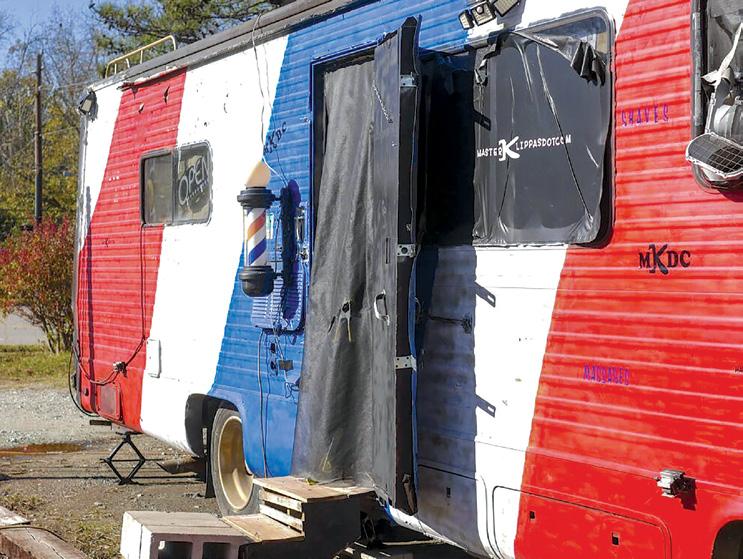
“That day kind of overwhelmed me, because it didn’t look like the same vehicle I bought,” he said. “It looked dirtier at first.”
His first mechanic botched the job, leaving Hall $3,800 in the hole with a broken-down RV. “What in the world did I put myself into?” he wondered.
Finding a good mechanic, Hall said, is like finding a good barber. If you find someone you like, “you better not change.” He finally found someone who got the RV running, and he doesn’t ever plan to let anyone else touch it.
Lofton feels the same way about Hall—he doesn’t plan to let anyone else cut his hair.
When Lofton recently moved 80 miles away to Goldsboro, he decided to keep coming back to see Hall. He likes the personal service he gets. Other barbers, Lofton said, “just want you in a chair and want to cut your hair and then on to the next. Marcus takes the time to get to know you and listens to what you want.”
While Hall’s clientele is mostly Black men, he is happy to take any client. He cuts women’s hair, straight hair, whatever. “I worked at a nail salon in Chapel Hill where I learned to cut Asian hair,” he said.
When a customer asked if he accepts credit cards, Hall was quick to confirm. “I take everything but food stamps,” he said, glancing in a mirror decorated around the edges with his Cash App, PayPal, and Square payment information.
Much of his income goes back into the shop itself. “As a struggling Black man, I have enough jobs to try to sustain myself and try to get above.” Hall said he’s worked for grocery delivery services like Instacart and just picked up a side job for peak season with Amazon.
If the business keeps prospering, Hall may eventually buy a bus that could have two or three barber chairs. But he never wants to go back to a brick-and-mortar shop. “It’s hard for clients to find good barbers, but it’s also hard for barbers to find great homes.” W
This story was produced through a partnership between the INDY and The 9th Street Journal. Visit our website to read the full version of this article.

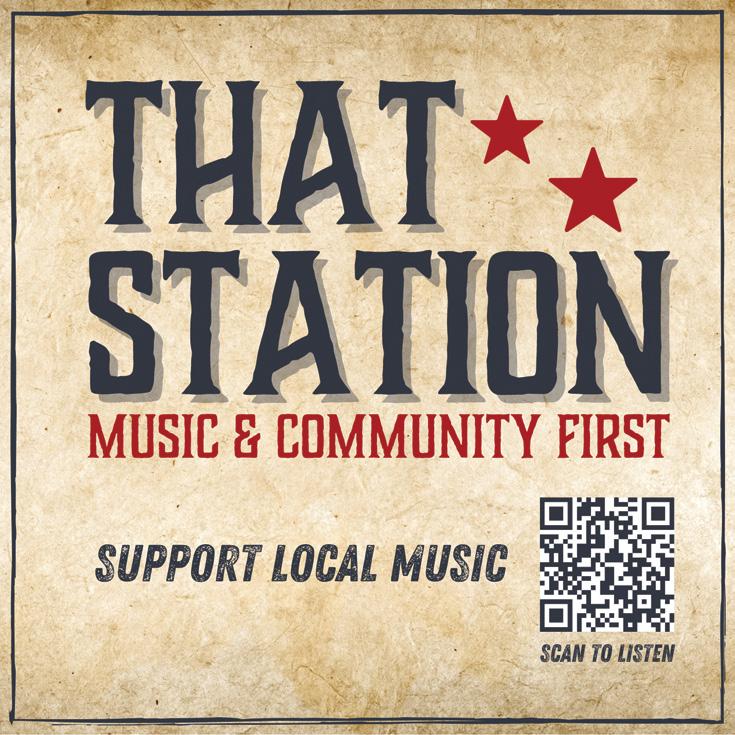
INDYweek.com December 14, 2022 15 Raleigh's Community Bookstore Register for Quail Ridge Books Events Series at www.quailridgebooks.com www.quailridgebooks.com • 919.828.1588 • North Hills 4209-100 Lassiter Mill Road, Raleigh, NC 27609 FREE Media Mail shipping on U.S. orders over $50 Who doesn’t love a mystery?! Mystery Boxes for grown-ups, children & families personally curated books, gif ts like socks, mugs, stickers, pins, etc. and/or a game/puzzle See website or call for details.
Visit INDYWeek.com for restaurant reviews and food & drink news.
Hear about that great new BBQ place.
Hall will bring the RV/barber shop to you—or you can often find it on NC Highway 55 near NC Central University.
PHOTO BY KULSOOM RIZAVI, THE 9TH STREET JOURNAL
Dec. 16, 8 p.m. | Cat’s
Growing Fame
Talking with Chapel Hill native Eliza McLamb about farming, making it on TikTok, and returning for a hometown show.
BY LENA GELLER arts@indyweek.com
There is perhaps no better way to sum up Eliza McLamb—an erudite old soul who has fallen into the role of Generation Z mouthpiece—than by peeking back at her life during the summer of 2020, when she was working as a farmhand in Kansas while simultaneously going viral on TikTok for a song she wrote called “Porn Star Tits.”
A Chapel Hill native who seized the shapelessness of early pandemic life as an opportunity to forge her own path, the 21-year-old McLamb is now a successful singer-songwriter as well as a professional podcaster, boasting around 70,000 regular listeners of Binchtopia, a weekly show where she and cohost Julia Hava guide listeners through the “current cultural hellscape.”

McLamb earns enough money from Binchtopia that she no longer has to worry about making a living through her music, which means that she’s eschewed songs like “Porn Star Tits”—an upbeat, unblushing bop that racked in plays on TikTok—for folksier indie rock tunes like the William Faulkner–inspired “Lena Grove” and the contemplative “Salt Circle,” which is also the titular track on her new EP. Ahead of her two upcoming shows at Cat’s Cradle, both of which sold out in a matter of hours, the INDY spoke with McLamb about her ascension as an artist, her latest music video, and her changing relationship with the platform that launched her career. This interview has been edited for length and clarity
INDY WEEK: To an observer, the past three years of your life have seemed like something out of a movie. Has it felt like a movie to you? Or more of a slog?
MCLAMB: It definitely depends on the day. I think COVID was a time where the bottom fell out from under everyone, and where all of the systems that we made up to make sense of the world ceased to exist. In that
sense, I felt like the world had opened up to me. During the first year, I leaned into uncertainty, which I guess is what happens in any great road trip movie.
Walk me through that first year—what are some of the grittier parts of the process that people don’t see publicly?
After COVID hit, I moved back in with my parents, then I found this job at this farm in North Carolina. It was wonderful. During that time, I was writing songs, and I started posting on TikTok; people would comment topics for me to write songs about, and it was a nice back-and-forth. But I definitely wasn’t a full-time TikTok creator; I was mostly butchering chickens and tilling the wheat.
Then I got a job at a farm in Kansas, and the TikTok stuff really started to blow up. But it was still a time when the world was so nebulous; I had no reason to believe that it would lead to anything, because it felt like everything was falling apart and we’d never have live music again. So I kept road-tripping through Colorado and Utah. I met a stranger on the road and traveled with him—everybody thought I was gonna get murdered, I’m very lucky to come out with my life—and then I eventually ended up in LA.
I lived in my friend’s laundry shed for a few months and sold solar panels door to door, which was horrible, but it built up my rejection sensitivity—I had to go into rich neighborhoods and talk to people face-toface during the pandemic.I quit that job and nannied until I made enough money to move in with my friend Julia, who was a new friend at the time. And then we started making the podcast. Six months after we started the podcast, I was able to transition to that being my full-time job. But I was still doing music. I put out an EP, I got management. All of the best things that happened to me came from my willingness to let shit hit the
fan—more often than not, I was able to get myself up and get through it.
What are some pros and cons of using TikTok to promote yourself as a musical artist?
TikTok did allow me to “go viral” and launch my music career, and I’m very grateful for that, but I’ve gravitated away from it. I come back to promote music here and there, but it’s healthier for me to not engage with it. Most of the songs that TikTok can meaningfully digest are songs that are immediately gratifying, extremely literal, and kind of like, punchy and a little kitschy. I had to get off TikTok in order to write songs that were more true to the music that I like to make.
I used to be branded as a TikTok artist, and I think I am starting to successfully move away from that label. A big indicator of that was when I got playlisted on Spotify in the folk category instead of in the “teen songs” or “TikTok hits” category.
In the music video for “Doing Fine,” you’re at a gas station and you scream “I’M DOING FINE” at the cashier while you’re buying a pack of condoms, a Slim Jim, and a scratch-off. Why those products? I wish I could say that we thought really deeply about it. That’s an idea that my director had, and I was like, sure. But if you think about it, when you’re having a tough time, the only fucking consistently good things about this world are sex and food and money.
You’ve talked about your difficult relationship with your mother in your songs, as well as on TikTok and in your Substack. How did you decide to share some of your personal familial struggles publicly?
I’m extremely lucky that my mom is actually, for the most part, very OK with me writing about our relationship. The main thing is that I’m not here to expose anybody or embarrass anybody; I’m not trying to, like, sell secrets for secrets’ sake. I’m just trying to figure it out. Also, when I write about people in my life, they always end up being a character who’s an amalgamation of my own projections. I know that when I write about people, I’m really always writing about myself.
That’s why I’m not a journalist. I have no intention of getting every single fact correct, nor do I think I have the capacity to do it, because I’m such a profoundly emotional person whose physical reality will always be clouded by my emotional reality.
How does it feel to sell out two shows at Cat’s Cradle?
Oh my god, it literally is a dream come true. Cat’s Cradle was such a staple of my youth. When I was a kid, I was always so worried about money that I figured I would just be a lawyer so I didn’t have to worry about my financial situation. I was resigned to keeping music on the back burner forever. And so this feels really surreal and really special. W
16 December 14, 2022 INDYweek.com
M U S IC
ELIZA MCLAMB
Friday,
Cradle, Carrboro
Eliza McLamb PHOTO BY KAYA KELLEY
music
Andy Frasco & the U.N. $17. Wed, Dec. 14, 8:30 p.m. Lincoln Theatre, Raleigh.
Jazz Vespers Wed, Dec. 14, 7 p.m. ERUUF Sanctuary, Durham.
Newberry & Verch: Holiday Cheer Tour $20. Wed, Dec. 14, 7:30 p.m. The Cary Theater, Cary.
North Carolina Symphony: ¡Feliz Navidad! $15+. Wed, Dec. 14, 7:30 p.m.
Duke Energy Center for the Performing Arts, Raleigh.
Trans-Siberian Orchestra Winter Tour $71+. Wed, Dec. 14, 7 p.m. PNC Arena, Raleigh.

40th Anniversary of REM’S Chronic Town $15. Thurs, Dec. 15, 8 p.m. Motorco Music Hall, Durham.
Eliza McLamb SOLD OUT. Thurs, Dec. 15, 8 p.m. Cat’s Cradle Back Room, Carrboro.
SOLD OUT. Fri, Dec. 16, 8 p.m. Cat’s Cradle Back Room, Carrboro.
Karl Blau $12. Thurs, Dec. 15, 8 p.m. The Pinhook, Durham.
Letdown. $15. Thurs, Dec. 15, 8:30 p.m. Local 506, Chapel Hill.
Turnover $25. Thurs, Dec. 15, 8 p.m. Cat’s Cradle, Carrboro.
The Vegabonds $15. Thurs, Dec. 15, 8:30 p.m. Lincoln Theatre, Raleigh.
5 Years of Get Sad
Y’all: An Emo & Pop Punk Party $20. Fri, Dec. 16, 8 p.m. Cat’s Cradle, Carrboro.
Arrested Development $28. Fri, Dec. 16, 8 p.m. Lincoln Theatre, Raleigh.
NCCU Jazz Faculty Holiday Concert $15+. Fri, Dec. 16, 7 and 9 p.m. Sharp Nine Gallery, Durham.
Voices Presents “Winter Joy” $20. Dec. 16-17, various times. Hill Hall, Chapel Hill.
Neighbor $15. Sat, Dec. 17, 8:30 p.m. Lincoln Theatre, Raleigh.
Nico’s Dream Sat, Dec. 17, 5 p.m. The Oak House, Durham.
Shaquim Muldrow Quartet $25. Sat, Dec. 17, 8 p.m. Sharp Nine Gallery, Durham.
The Wusses with DJ Craig Layabout $15. Sat, Dec. 17, 8 p.m. Motorco Music Hall, Durham.
Carolina Waves: 5 Year Anniversary Year End Mixer $15. Sun, Dec. 18, 8 p.m. Motorco Music Hall, Durham.
Geoff Clapp Quartet $25. Sun, Dec. 18, 7 p.m.
Sharp Nine Gallery, Durham.
Raleigh Flute Choir: A Celebration of Christmas, Hanukkah, and the Winter Season $10. Sun, Dec. 18, 2 p.m. North Carolina Museum of History, Raleigh.
WQDR Christmas Show featuring Scotty McCreery, George Birge, and Kylie Morgan $40. Sun, Dec. 18, 6:30 p.m. Lincoln Theatre, Raleigh.
Jeremy “Bean” Clemons Jazz Trio Tues, Dec. 20, 9 p.m. Kingfisher, Durham.
screen stage
Holiday Classics Screening Series: Home Alone Wed, Dec. 14, 7 p.m. Durty Bull Brewing Co., Durham.
Catchfire Thurs, Dec. 15, 7 p.m. Shadowbox Studio, Durham.
Miracle on 34th Street $6. Thurs, Dec. 15, 2 p.m. The Cary Theater, Cary White Christmas and Holiday Inn $10. Fri, Dec. 16, 7 p.m. The Carolina Theatre, Durham
North Carolina Chinese Lantern Festival $16+. Nov. 18–Jan. 8, various times. Koka Booth Amphitheatre, Cary.
Silent Sky $20 Dec. 1-18, various times. Burning Coal Theatre Company, Raleigh
A Christmas Carol $37+. Dec. 14-18, various times. DPAC, Durham
NUTCRACKER!
Magical Christmas Ballet $30+. Thurs, Dec. 15, 7 p.m. The Carolina Theatre, Durham.
Carolina Ballet: The Nutcracker $42+. Dec. 16-22, various times. Duke Energy Center for the Performing Arts, Raleigh

Girls in Geish: Sub Zero $10. Sat, Dec. 17, 9:30 p.m. The Pinhook, Durham.
A Magical Cirque Christmas $66+. Mon, Dec. 19, 7:30 p.m. DPAC, Durham.
INDYweek.com December 14, 2022 17
The Trans-Siberian Orchestra performs at PNC Arena on Wednesday, December 14.
PHOTO COURTESY OF PNC ARENA
The Nutcracker Magical Christmas Ballet performs at The Carolina Theatre on Thursday, December 15.
PHOTO COURTESY OF THE CAROLINA THEATRE
like to plan ahead? FOR OUR COMPLETE COMMUNITY CALENDAR: INDYWEEK.COM like to ahead? C U LT U R E CA L E N DA R Please check with local venues for their health and safety protocols.












































18 December 14, 2022 INDYweek.com INDY CLASSIFIEDS classy@indyweek.com If you just can’t wait, check out the current week’s answer key at www.indyweek.com, and click “puzzle pages” at the bottom of our webpage. P U Z Z L E S www.harmonygate.com Homes Homes! 1 trained families to just staceymcclelland8@ su | do | ku © Puzzles by Pappocom There is really only one rule to Sudoku: Fill in the game board so that the numbers 1 through 9 occur exactly once in each row, column, and 3x3 box. The numbers can appear in any order and diagonals are not considered. Your initial game board will consist of several numbers that are already placed. Those numbers cannot be changed. Your goal is to fill in the empty squares following the simple rule above. If you just can’t wait, check out the current week’s answer key at www.indyweek.com, and click “puzzle pages.” Best of luck, and have fun! www.sudoku.com this week’s puzzle level: 12.14.22 solution to last week’s puzzle #25 MEDIUM#25 9385 4286 63 6 8675 7369 542987136 197623485 638415972 421836597 986571324 375249618 259168743 863794251 714352869 #26 MEDIUM#26 7326 781 94 4583 68 2417 85 147 5927 574132689 236798541 981564723 458271936 617349258 329685417 742816395 193457862 865923174 #27 MEDIUM#27 4936 81 28 179 9685 296 53 82 2467 745189362 238476591 619532748 453817926 976243815 182965437 597321684 861794253 324658179 #28 MEDIUM#28 5387 26 973 9718 23 3294 168 42 6975 165328794 732194658 498675132 649731825 251846973 873259416 517462389 984513267 326987541 www.sPage7of25 udoku.com30/10/2005 www.regulatorbookshop.com 720 Ninth Street, Durham, NC 27705 Hours: Monday–Friday 10–7 | Saturday & Sunday 10–6 YEARHOLIDAYDURHAM SHOPPING TRADITION.




INDYweek.com December 14, 2022 19 INDY CLASSIFIEDS classy@indyweek.com C L A S S I F I E D S HEALTH & WELL BEING 919-416-0675 www.harmonygate.com SERVICES RECYCLE THIS PAPER LAST WEEK’S PUZZLE To adver tise or feature a pet for adoption, please contact adver tising@indyweek.com To adver tise or feature a pet for adoption, please contact adver tising@indyweek.com To adver tise or feature a pet for adoption, please contact adver tising@indyweek.com To adver tise or feature a pet for adoption, please contact adver tising@indyweek.com To adver tise or feature a pet for adoption, please contact adver tising@indyweek.com
Best Triangle 2023 of the 2023’s “Best of the Triangle” Readers’ Poll will be ramping up soon, and we’re asking for your help in identifying the categories that matter most to you—our readers. Please scan the QR code and submit the categories you want to vote on next year! vote.indyweek.com

 CHILDRESS
CHILDRESS










 BY CHAD KNUTH backtalk@indyweek.com
BY CHAD KNUTH backtalk@indyweek.com




















































